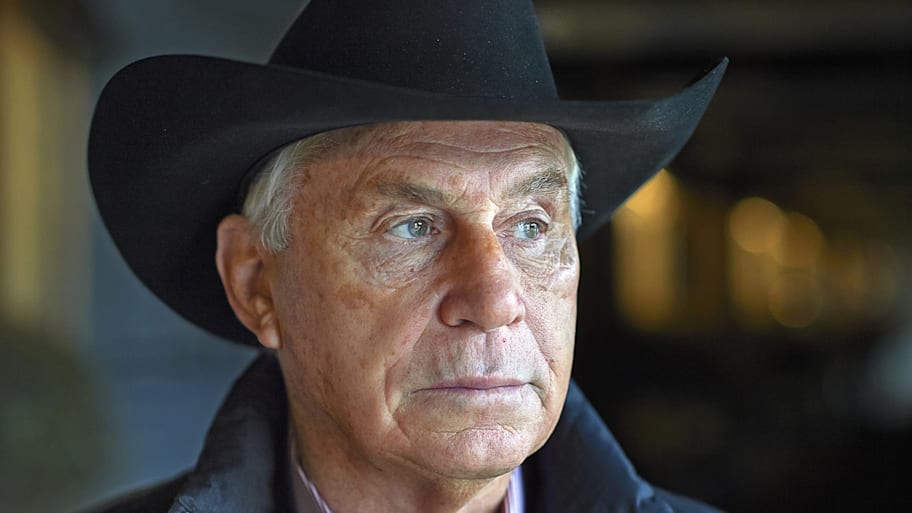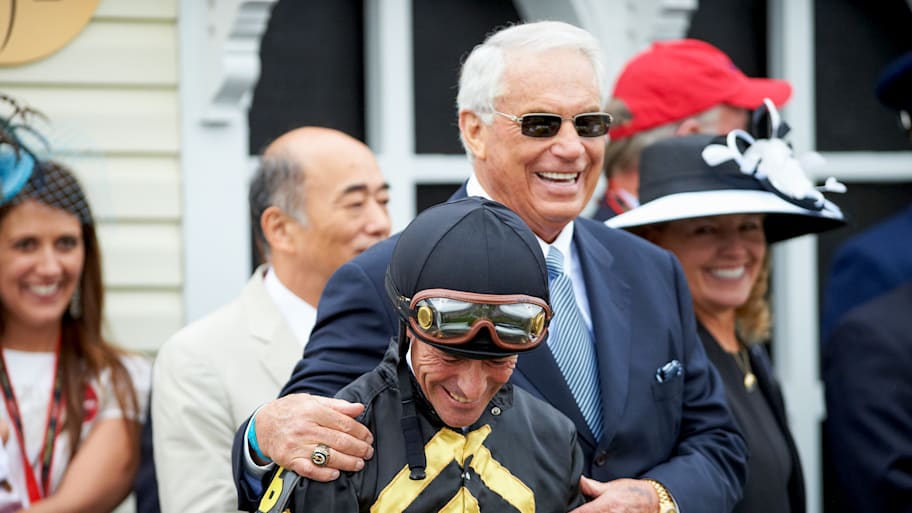
It was early May 1994, and D. Wayne Lukas had been on a brutal run. The erstwhile king of thoroughbred trainers hadn’t won a Grade I stakes race in more than two years, had lost his 10-year grip on the national training title, had endured the fatal breakdown of Union City in the 1993 Preakness, and had seen his son and top assistant, Jeff, suffer a severe brain injury when he was run over by a fractious colt named Tabasco Cat. Outside Barn 44 at Churchill Downs one morning leading up to that year’s Kentucky Derby, I asked Lukas how he was handling the pileup of adversity.
He scoffed.
“You can strip me naked and drop me off in East L.A. at midnight, and I’ll be back in a month,” Lukas said, flashing a smile that seemed like a threat. “I’ll be back with my clothes on, a full stable and a nice place to work.”
If ever a quote defined a man …
Lukas’s streak of Grade I futility extended through that Derby, but less than three weeks later, Tabasco Cat won the Preakness and followed it up by winning the Belmont. That launched an unprecedented run in training annals. Lukas swept the ’95 Triple Crown with two different horses — Thunder Gulch won the Derby and Belmont but lost the Preakness to stablemate Timber Country. He completed consecutive Lukas Triples the following spring when Grindstone won the ’96 Derby by a nose.
Six straight Triple Crown wins. Four different horses. One singular, indomitable trainer.
There was never any deterring Darrell Wayne Lukas, whose abrupt retirement from racing at age 89 was announced Sunday amid serious health complications. He had long intimated that he would die on the job, and he appears to have come gravely close to doing so. His last win was June 12, and his last horse ran June 14.
Lukas’s 15 Triple Crown victories spanned from 1980 to 2024 and ranked second-most in history behind rival-turned-friend Bob Baffert’s 16. His 20 Breeders’ Cup wins share the record with Irish conditioner Aidan O’Brien. His pedigree as the mentor of former assistants who became accomplished trainers is unmatched.
A former high school basketball coach from Wisconsin was an unlikely candidate to revolutionize horse racing, but Lukas had the zeal and ambition to do it. He hustled tirelessly across the Midwest and Southwest buying and racing quarter horses, then upped his game to the thoroughbred ranks and became a disruptive force.
As his success exploded at the highest level, Lukas pioneered having full racing stables at tracks in virtually every region. At its height, D. Wayne Lukas Racing Stables had more than 400 horses and 380 employees, not to mention a private jet and helicopter access.
His operation went national, moving his top horses around the country to hit the big races in big places. “D. Wayne off the plane” became part of the handicapping nomenclature — when he showed up, he was a factor. There was no avoiding him.
Lukas became the national face of the sport in the 1980s and ‘90s, relentlessly passionate about promoting it as he was about dominating it. He brought an element of swagger to what can be a taciturn profession—riding ponies to the track for morning training in suede chaps and a white Stetson, then showing up for afternoon races in expensive suits and aviator sunglasses. He loved discussing racing in mainstream sports terms, relating it to casual fans.
Lukas left an indelible mark on horse racing by force of personality and force of will. He pushed hard with his horses, sometimes too hard, sparking criticism from some corners about the attrition rate as he chased Triple Crown glory. He was a hard man to ride for, often critical of his jockeys and quick to make a rider change. He was hard to work for, demanding a spotless barn area and clockwork efficiency. He was probably a hard man to live with, having been married five times. His relationship with Jeff Lukas, whose injuries suffered in the Tabasco Cat accident were debilitating, was at times touching but also felt restrained.
It was fitting that Lukas is a close friend and admirer of legendary basketball coach Bob Knight, sharing a similar worldview. Their unstinting pursuit of excellence came without compromise or apology.
Unlike Knight, Lukas possessed an elephant’s hide in terms of criticism. After a critical column I wrote in 1997 about his foisting an overmatched colt named Deeds Not Words into the Derby to extend his personal streak to 17 straight years in the race, he challenged me to fight in the Churchill parking lot. The fight never happened, the horse finished last, and Lukas got over being mad shortly thereafter. To my knowledge, he never turned down an interview from anyone who had ripped him.
Lukas was always bold where others would exercise caution, and it often worked out—his first Derby win was with a filly, Winning Colors in 1988, just the third female horse to win the 151-year-old race, and still the last to have done so. His last Derby win was with Charismatic in 1999, running the horse back just two weeks after the Lexington Stakes and pulling the upset at 31–1 odds.

He scored in the 2013 Preakness with a 15–1 shot Oxbow, a horse that hadn’t won a race in four months on the Triple Crown prep trail. Lukas kept changing jockeys on Oxbow until he landed on 50-year-old Gary Stevens — the seventh to ride the horse — who stole that race on the front end with a dawdling pace.
He kept getting quality horses into his 80s and kept doing right by them. Lukas won the Kentucky Oaks in 2022 at age 86 with Secret Oath, celebrating that triumph with a cup of Wendy’s chili. Two years later, he became the oldest trainer to win a Triple Crown race, capturing the Preakness with Seize the Grey at 88.
In defiance of the passage of time, he was impossible to count out. Every time Lukas looked done, he’d show up with his clothes on, a full stable and a nice place to work.
D. Wayne really seemed like he might go on in perpetuity. Then came the 2025 Derby.
Lukas brought a strapping son of Triple Crown winner Justify to the race named American Promise, who punched his ticket by winning the Virginia Derby in March. It was Lukas’s 51st Derby runner, the most in the history of the race.
For decades, the one constant leading up to the Derby was the presence of Lukas at Churchill Barn 44, arriving before dawn and heading out to the track on horseback to oversee training. In recent years, his posture curved as he stooped in the saddle and needed a step-stool to get on his pony. (A capitulation to age he hated.) But he was always out there.
That changed this spring. Lukas stayed home a couple of April mornings leading up to the race, leaving things to his assistants. Most days, he was out there, and occasionally still held court with his forearms resting on the sawhorse in front of his barn. But even brief absences were noticeable from a workaholic who never skipped a day.
Even with the characteristic twinkle in his eye, he looked and sounded frail. Something clearly was amiss.
American Promise ran 16th in the Derby, cooked by being too close to a stout pace. Lukas being Lukas, never afraid to take a puncher’s chance, he ran the colt back in the Preakness and finished eighth. And that was the last we would see of D. Wayne Lukas on the Triple Crown trail.
As an innovator and competitor, he played a vital role in defining modern thoroughbred racing. Barn 44 at Churchill Downs, and all the other American racetrack barns that have housed his horses, will feel empty without the man who always believed he would win forever.
This article was originally published on www.si.com as D. Wayne Lukas Didn’t Just Train Horses—He Changed the Game.







